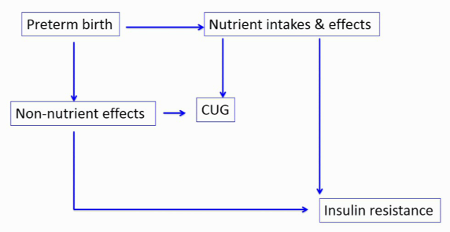Catch-up Growth in Preterm Babies and the Impact on IQ

Babies who are born preterm often experience periods of poor growth or ‘growth failure’, a term used to describe a child who grows at a rate that is notably slower than normal for the child’s age and sex [Embleton et al, 2001]. Preterm babies can start off at a disadvantage, often losing 5–10% of their body weight in the first few days of life and taking up to 14 days to regain it. Although most preterm infants do eventually catch up to the normal growth curve, there may be long-term effects of growth failure in terms of metabolism (including, but not limited to, obesity and blood sugar disorders) and brain development [Wood et al, 2013].

Scientific research has linked growth failure in infants with negative effects on mental functions and processes (cognition) that continue into early adulthood [Embleton et al, 2015]. As a lead investigator for the Newcastle Preterm Birth Growth Study, I have looked in detail at the potential relationship between growth patterns in the first year of life and cognition in teenagers. As well as poor growth and growth failure, we are particularly interested in ‘catch-up growth’ (periods of very fast acceleration in growth). Although infant formulas to promote catch-up growth are available, their use is controversial because of an increased risk of metabolic effects in later life [Embleton et al, 2015]. We conducted a study to try to understand the balance between the competing outcomes of metabolic problems and cognitive benefit.
Babies with better weight gain have an IQ benefit in later life
When we looked at patterns of growth over the first year of life, it was quite clear that babies who gained more weight – particularly over the first 3 months – have a gain in IQ of around 5 points for every 1-point increase in a standard statistical score using either weight gain or head growth as a marker of growth rate [Embleton, 2014]. Looking at these improvements in closer detail, we found that the specific contributors to the increase in IQ were slightly different for weight gain and head growth. What this tells me is that there is a window of opportunity to improve cognition through nutrition in preterm infants, and that timing is critical.
Research tells us that preterm babies have an average IQ of around 85 or 90, so those 5 extra points could be of enormous benefit to a child who would function just below the normal range without intervention. Of course, it may be less important for children at the top of the range.
Early nutrition is important for cognitive performance
Despite the evidence to suggest that good nutrition improves survival and cognitive outcomes in preterm babies, nutrition is often not the focus of care [Embleton, 2014; Wood et al, 2013; Puntis, 2006]. Fully exploiting the window of opportunity for improving cognition is of major importance to clinical practice. I believe that nutrition has a role to play but it is not the only answer. Non-nutritional factors may also be important, though many of these are likely to be harder, if not impossible, to change.
Rapid catch-up growth itself is not the cause of metabolic problems in later life, but if we can avoid the need for it by avoiding growth failure in the first place, all the better[Embleton, 2014]. Personally, I recommend the use of early and intensive nutritional support for preterm babies, starting with intravenous feeding when an infant is admitted to the neonatal intensive care unit. For this, I suggest using supplements that are high in quality fats (such as olive and fish oils) and amino acids for protein. The next step would be to introduce expressed breast milk as soon as possible (ideally within 10–12 hours of birth) and maintain this feeding at a daily volume of around 200 ml per kg. I also recommend adding a supplement to fortify the breast milk with the aim of avoiding growth failure.

Rapid catch-up growth is not the cause of metabolic problems in later life
See our other experts opinion

Antibiotics Early in Life Alter Colonization and Predisposes to Obesity



Human Milk Oligosaccharides – Compositional Analysis and Metabolism in Infants
